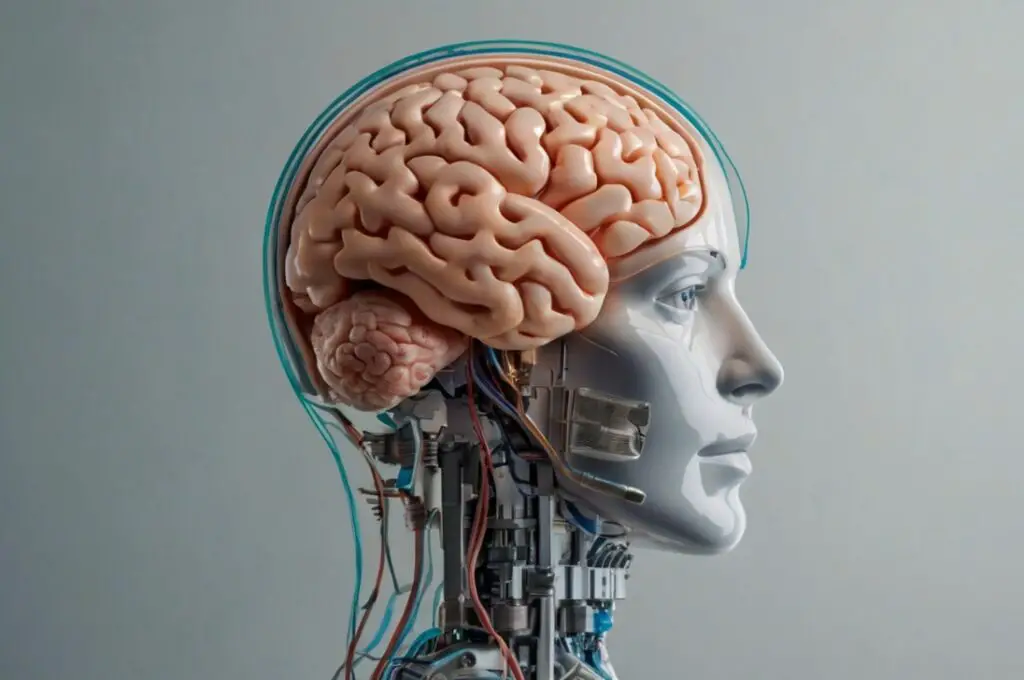
Artificial intelligence (AI) is transforming our world faster than we ever imagined.
From self-driving cars to personalized recommendations, AI is making daily life easier and more efficient.
However, as this technology becomes more sophisticated, experts are raising concerns about its risks.
While AI has incredible potential, its growing presence in our lives—and even, someday, our own minds—makes it crucial to consider both its benefits and its potential drawbacks.
The Rise of AI and Its Implications
The Benefits of AI
AI is bringing major improvements across many areas, from healthcare to entertainment.
By quickly analyzing huge amounts of data, AI helps professionals make faster and more accurate decisions.
Here’s a closer look at some of AI’s key benefits:
Medical advancements
AI tools are revolutionizing healthcare.
They help detect diseases, like cancer and heart disease, earlier than ever.
In fact, a study from The Lancet Digital Health in 2020 showed that some AI systems can identify breast cancer with the same accuracy as expert radiologists.
This means patients can get faster diagnoses and start treatment sooner, potentially saving lives.
Increased efficiency
AI-powered automation helps companies work faster and with fewer mistakes.
This is especially valuable in fields like manufacturing, where robots can handle repetitive tasks with incredible accuracy.
As a result, companies save time, cut costs, and produce high-quality products.
Data insights and predictions
AI can analyze customer behavior to predict future trends.
This helps businesses make smarter decisions based on real data.
It’s also why platforms like Netflix and Amazon seem to know what you’ll like next—they use AI to personalize recommendations, which makes for a better user experience and happier customers.
These benefits showcase AI’s potential to make life easier, healthier, and more efficient.
However, the rapid development of this technology has also raised significant concerns.

The Potential Dangers of AI
While AI offers many benefits, it also brings some serious challenges and risks for individuals and society.
Here’s a closer look at some of the most pressing concerns:
Job displacement
AI and automation are changing the job market.
Many tasks that people currently do could soon be handled by machines, putting millions of jobs at risk.
A report from the World Economic Forum predicts that 85 million jobs may be replaced by 2025 due to AI.
While new jobs will also emerge as a result of AI, the shift could be hard for many workers, who may struggle to adapt to new roles or retrain quickly enough.
Privacy and surveillance
AI systems often track our online activity, collecting vast amounts of personal information.
This can lead to concerns over privacy, especially with technologies like facial recognition and predictive policing.
Many people worry about how this data might be used, and whether AI will lead to increased surveillance that affects personal freedoms and privacy.
Autonomous weapons
There’s also concern about AI being used to create autonomous weapons—machines that can make decisions on their own in dangerous situations.
If not managed responsibly, these technologies could be used improperly or even hacked, leading to potentially serious consequences.

The Intersection of AI and the Human Brain
AI’s reach doesn’t end with external applications.
Increasingly, researchers are exploring how AI might enhance or even merge with the human brain.
Known as “brain-machine interfaces” (BMIs), these technologies allow for communication between the human brain and external devices.
But while AI-driven BMIs offer exciting potential, they also come with substantial risks.
The Potential for AI to Enhance Human Cognition
One of the most ambitious applications of AI involves its potential to enhance human intelligence.
Imagine a future where humans could directly interface with machines to boost cognitive capabilities, learn new skills instantly, or even “upload” their consciousness to a digital medium.
A few key developments in AI-human enhancement include:
Neural implants
Companies like Neuralink, started by Elon Musk, are developing brain implants aimed at treating neurological problems and even enhancing memory.
These implants could someday allow direct communication between our brains and machines.
For example, they could help paralyzed individuals regain movement or allow people with brain injuries to recover lost functions.
Cognitive augmentation
AI may also boost mental abilities, helping people improve memory, make better decisions, or even gain advanced cognitive skills.
Imagine having AI support to multitask efficiently or come up with creative solutions to complex problems.
This technology has the potential to push human thinking and creativity beyond current limits.
Assistive technologies for the disabled
AI-driven brain interfaces could greatly help those with disabilities.
For instance, they could restore communication for people with ALS or enable individuals with paralysis to control prosthetic limbs using only their thoughts.
This could mean a big leap forward in independence and quality of life for many.
While this vision of AI-enhanced cognition is inspiring, it raises critical ethical and practical concerns.

The Risks of AI-Human Integration
Integrating AI with the human brain sounds exciting, but it brings serious ethical and security concerns that need to be addressed.
Here’s a breakdown of the risks:
Loss of autonomy
If AI technology has the ability to influence our thoughts or memories, there’s a risk of losing control over our own minds.
For example, a brain implant meant to improve memory could unintentionally change other mental processes, possibly affecting one’s personality or sense of identity.
This would raise complex questions about who we really are if our thoughts can be influenced by AI.
Privacy concerns
AI-powered brain implants could collect huge amounts of personal information.
While this data could be helpful in medical settings, it raises big questions around privacy—like who owns the data, who can access it, and how much control we really have over it.
Security threats
There’s also the risk of hackers. If brain-machine interfaces are hacked, it could have terrible consequences, as attackers might manipulate thoughts or behaviors.
This would pose a direct threat to personal safety and autonomy.
Widening social inequality
AI-enhanced abilities might only be available to those who can afford them, creating a divide between people who are “enhanced” and those who are not.
This could worsen social inequalities and even lead to discrimination based on who has access to these advanced technologies.

Final Thoughts
The future of AI in relation to the human brain presents immense opportunities, but it also poses complex challenges.
As AI advances, we must be prepared to address these risks proactively.
Ethical guidelines, regulatory frameworks, and continued research are essential to ensure that AI enhances human life without compromising privacy, security, or autonomy.
AI offers incredible benefits and a vision of expanded human potential, but the balance between progress and caution will be crucial in determining how we use this technology.



